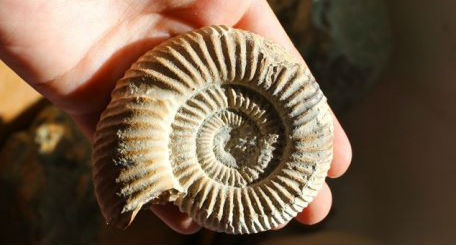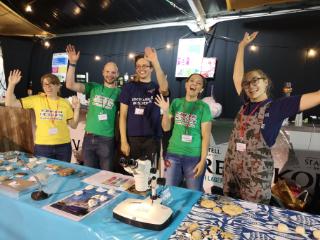Deep time global change
Deep time global change
Deep time global change
The Deep Time Global Change group's interest lies in understanding the geological history and governing processes behind some of the major environmental changes that have affected the Earth through deep time. Our work spans the planetary realms from lithosphere to atmosphere, and an age range from the Precambrian to the Quaternary. We work with samples from cores and outcrops, collected as a result of field programmes or through participation in international scientific drilling programmes.
View our recent publications »
Group members
Academic staff
| Name | Position | Principal research areas |
|---|---|---|
| Professor Stephen Hesselbo | Professor of Geology |
Jurassic stratigraphy, carbon cycling and paleoclimate; |
| Dr Kate Littler | Senior Lecturer in Geology | |
| Dr Sev Kender | Senior Lecturer in Palaeontology |
Jurassic and Cenozoic paleoclimate; Microfossils and geochemistry |
| Dr Clemens Ullmann | Lecturer in Geology |
Constraining relationship between chemical composition of sea water and macrofossil shell calcite; |
| Dr Kara Bogus | Honorary Research Fellow/ JET project administrator |
IODP, Cretaceous OAEs, organic geochemistry, palynology |
Current PhD and and MSc-by-Research students
| Name | Project details |
|---|---|
| Rebecca Parker |
Primary supervisor: Kate Littler (formally Dr Ian Bailey). 2017 - present |
| Dominika Szucs |
Primary supervisor: Prof Stephen Hesselbo 2017 - present |
| Teuntje Hollaar |
Primary supervisor: Claire Belcher (Exeter Geography) Co-supervisor: Prof Stephen Hesselbo 2017 - present |
| Chloe Walker-Trivett |
Primary supervisor: Dr Sev Kender 2018 - present |
| Tom Gibson |
Primary supervisor: Dr Sev Kender 2018 - present |
| Mengjie Jiang |
Primary supervisor: Prof Stephen Hesselbo 2018 - present |
| Erica Mariani |
Primary supervisor: Dr Sev Kender 2018 - present |
| Chloe Young |
Primary supervisor: Dr Kate Littler Co-supervisors: Dr Ian Bailey, Dr David Naafs, Prof. Richard Pancost, Prof. Melanie Leng, Dr Pallavi Anand 2019 - present |
|
Primary supervisor: Dr Kate Littler Co-supervisors: Dr Ian Bailey, Dr Pallavi Anand |
|
|
Primary supervisor: Dr Sev Kender Co-Supervisors: Dr Claire Allen, Professor James Scourse 2021- present |
|
|
Primary supervisor: Dr Sev Kender Co-Supervisors: Dr Ian Barnes, Dr Claire Allen, Prof James Scourse, Prof Mel Leng 2021- present |
Recent PhD students
| Charlotte Beasley |
Primary supervisor: Dr Kate Littler Co-supervisors: Prof Stephen Hesselbo, Dr Sev Kender 2016 – 2021 |
| Alex Hudson |
Primary supervisor: Prof Stephen Hesselbo Co-supervisor: Dr Kate Littler, Dr James Riding (BGS), Dr Daniel Condon (BGS), Prof. Conall Mac Niocaill (University of Oxford) 2016 – 2021 |
| James Barnet | Primary supervisor: Dr Kate Littler Co-supervisors: Prof Dick Kroon (Edinburgh) 2014 – 2018 (completed December 2018) |
| Keziah Blake-Mizen | Primary supervisor: Dr Ian Bailey Co-supervisors: Prof Stephen Hesselbo, Dr Craig Storey (Portsmouth) 2014 – 2019 (completed June 2019) |
| Robyn Pointer | Primary supervisor: Prof Stephen Hesselbo. Co-supervisors: Dr Claire Belcher, Dr Kate Littler, and Gregory Pienkowski (Polish Geological Institute) 2014 – 2019 (completed March 2019) |
| Ricardo Celestino | Primary supervisor: Prof Stephen Hesselbo Co-supervisors: Dr Stuart Robinson (Oxford) and Erdem Idiz (Shell) 2014 – 2018 (completed December 2018) |
Projects
The new group are currently working on the following main areas of research:
The history and the causes of Pliocene warmth, and what combination of processes led to its termination during the onset of Quaternary-style glaciations, are still poorly understood. The Exeter Pliocene research group, led by Dr Ian Bailey and Dr Kate Littler at Camborne School of Mines, in collaboration with Prof Paul Wilson, Prof Gavin Foster and David Lang at the University of Southampton and colleagues at the universities of Bristol, Heidelberg in Germany and Lamont, Lafayette, and Brown in the USA, seeks to address these issues principally by studying marine records drilled by the Integrated Ocean Drilling Program (IODP) and its predecessors.
Find out more about Pliocene research »

Direct observations indicate that the Greenland Ice Sheet is currently losing mass at an accelerating rate and if it were to melt completely it would raise global sea-level by ~7 m, with profound consequences for countless populations that reside in coastal areas. If we are to have confidence in the ability of ice sheet models to predict the fate of the Greenland Ice Sheet over the coming century we need to accurately simulate its configuration for various past climate states. Such model outputs, however, need to be tested with geological evidence. We aim to do this by reconstructing ice sheet coverage in the geological past with a particular emphasis on Greenland Ice Sheet reduction during warmer than present time intervals. One important contribution to this problem is to compare the output of models with marine-core proxy evidence for past locations of iceberg calving.
Find out more about Greenland ice sheet research »

Two related issues that solicit much debate in Earth sciences focus on the extent to which glacial expansion during the Quaternary has influenced erosion intensity, and whether any subsequent mass redistribution of sediments from glaciated zones of active orogenesis is capable of rapidly altering patterns of tectonic deformation.
Find out more about Southern Alaskan continental margin research »

Unravelling how climate, the carbon-cycle and the oceans interacted in warm climates of Earth’s deep past is paramount if we are to better understand both the modern and future carbon-cycle-climate system, particularly in the context of ongoing anthropogenic burning of fossil fuels.
Constraining the long-term paleoclimate and carbon-cycle dynamics of the ancient ‘greenhouse’ worlds of the Cretaceous and Early Paleogene (~145 to 34 million years ago), offers us the chance to explore a possible analogue for a much warmer future Earth. This enigmatic time period witnessed great changes in global climate, from the peak warmth of the mid Cretaceous ‘super-greenhouse’, to the cooler late Cretaceous and Paleocene, and on to the Early Eocene Climatic Optimum, where average temperatures in the Arctic may have surpassed a balmy 25°C and temperate forests blanketed Antarctica.
Find out more about Cretaceous-Paleogene research »

JET is a large-scale, multi-faceted, international programme of research on the functioning of the Earth system at a key juncture in its history – the Early Jurassic. At that time the planet was subject to distinctive tectonic, magmatic, and orbital forcing, and fundamental aspects of the modern biosphere were becoming established in the aftermath of the end-Permian and end-Triassic mass extinctions.
Find out more about JET research »

Macrofossil calcite has widely been used as an archive of palaeotemperatures through Earth history, reaching back to the latest Precambrian, when shell-building animals first evolved. Such shell material is of considerable importance for understanding past climates and large, fast-growing organisms may even capture seasonal fluctuations in environmental parameters. In particular, proxy data from macrofossil calcite has helped to better constrain the carbon cycle, palaeotemperature and seawater composition of the Palaeozoic and Mesozoic (~541 to ~66 million years ago). Due to their comparatively large size, macrofossil shells are ideally suited for a series of applications which are currently focus of research at Camborne School of Mines.
Find out more about macrofossil calcite research »

Antarctica is one the fastest changing regions of the world in terms of global warming, with significant ice sheet loss on the West Antarctic Peninsula in recent decades and changing ocean circulation. We are studying marine sediment cores from offshore Antarctica, the Falkland Plateau and South Georgia, analysing chemical proxies for changes to ocean temperature and biota.
Dr Sev Kender travelled to the Antarctic Peninsula in December 2018 on the British Antarctic Survey research ship RRS James Clark Ross, where he collected sediment cores from underneath recently melted ice shelves.

Deployment of gravity corer from the RRS James Clark Ross, proximal to a recently retreated ice shelf within Marian Cove, King George Island. Image credit: Sev Kender
Find out more about Glacial–Holocene Antarctic Change >>
Outreach
The DTGC group actively takes part in outreach activities with young people and members of the public in Cornwall and beyond. Details of some of these are listed below.
Please get in touch if you would like to suggest an outreach event we can be involved with.
The DTGC group regularly take part in running the "Earth Zone", as part of the fantastic annual Science in the Square event in Falmouth. Around 2000–3000 people from far and wide attend this hectic 4-hour event, where they learn about biology, geology, geography and everything in between. Our group showcase the wonderful world of geology, from fossils to minerals, with deep-sea drilling and climate change in the mix too!
In 2016 Kate was able to show the visitors a replica International Ocean Discovery Program (IODP) deep-sea core containing the K-Pg boundary, borrowed from the European Consortium for Ocean Research Drilling (ECORD), which she used to explain the death of the dinosaurs and the bolide impact that triggered the extinction. For 2019 it was all about the (micro)fossils, with real specimens, salt dough, and the interactive sandbox.


The DTGC group regularly take part in running the "Earth Zone", as part of the fantastic annual Science in the Square event in Falmouth. Around 2000–3000 people from far and wide attend this hectic 4-hour event, where they learn about biology, geology, geography and everything in between. Our group showcase the wonderful world of geology, from fossils to minerals, with deep-sea drilling and climate change in the mix too!
In 2016 Kate was able to show the visitors a replica International Ocean Discovery Program (IODP) deep-sea core containing the K-Pg boundary, borrowed from the European Consortium for Ocean Research Drilling (ECORD), which she used to explain the death of the dinosaurs and the bolide impact that triggered the extinction. For 2019 it was all about the (micro)fossils, with real specimens, salt dough, and the interactive sandbox.


In June 2016, Dr Kate Littler and Dr Nathan Mayne (Physics) hosted an evening of talks and discussions at the Penryn Campus, designed to showcase the links between studying the ancient climate of Planet Earth and the strange atmospheres of far-off exoplanets.
Through the medium of paper models, cake, and replica cores from the International Ocean Discovery Program (IODP), Dr Kate Littler and Dr Clemens Ullmann had a day trip to Exeter to bring the joy of paleoclimate to the masses in June 2016. Much fun was had by all.
Read more on the Soapbox Science website.

Dr Kate Littler represented Geology and Camborne School of Mines at this event in June 2015, aimed at getting year 12s to consider careers in STEM-related areas.

